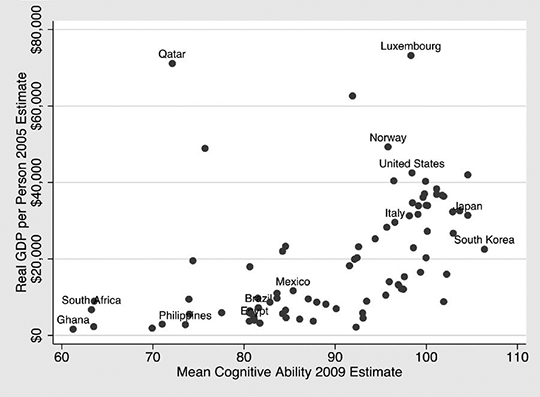National IQ - the modern taboo
Any discussion of inherent cultural differences is taboo under the mindless modern cult of multiculturalism. So, too, is discussion of inherent IQ differences between peoples, races, and nations.
In the book Hive Mind - How your nation's IQ matters so much more than you own, Garrett Jones contends that intelligence and cognitive skill are hugely important on a national level. This results in a cultural environment that is more patient and is more competent and capable.
In his July 15, 2017 Unz review article HIVE MIND: How Third-World Immigration Into the West Threatens Prosperity and Progress for the Whole World, Steve Sailer points out that "The highest IQ countries are on average eight times more prosperous than those with the lowest scores." This chart from Jones' book illustrates the point:
Sailer reports that:
Jones... an economist at George Mason University, succeeds in explaining why this is the case. Relying on previous studies using laboratory experiments and other kinds of data, he shows that smarter groups of people are more cooperative, more patient, and more likely to choose rational economic policies through the political process. All of these facts have important economic implications...
The lower a country’s average IQ, the more people you have on the extreme left end of the bell curve. Furthermore, Jones argues that higher IQ groups, by having individuals that are better behaved, create conformity norms that create positive externalities for the rest of society...
The lower a country’s average IQ, the more people you have on the extreme left end of the bell curve. Furthermore, Jones argues that higher IQ groups, by having individuals that are better behaved, create conformity norms that create positive externalities for the rest of society...
The implications of all this for the immigration debate seem pretty straightforward... [Jones] is now arguing that if immigrants cause the slightest decline in the institutions of First World countries and if this reduces research and innovation, that alone may pretty quickly wipe out the gains to the immigrants themselves...
In the July 18, 2012 Unz Review article Race, IQ, and Wealth - What the facts tell us about a taboo subject, Ron Unz discusses national IQ differences and techniques of measurement:
... Although “intelligence” may be difficult to define precisely, most people have accepted that IQ scores seem to constitute a rough and measurable proxy for this trait, so Lynn and Vanhanen have collected a vast number of national IQ scores from the last 50 or 60 years and compared these to income levels and economic growth rates...
... if high national IQ scores are correlated with economic success, perhaps the high IQs cause the success, but it seems just as possible that the success might be driving the high IQs, or that both might be due to some third factor. Correlation does not imply causality, let alone the particular direction of the causal arrow...
Fortunately, a careful examination of the wealth of empirical data they have gathered provides some important evidence on the relative plausibility of these conflicting hypotheses, allowing us to draw useful conclusions in this extremely taboo subject...
Related articles
Yes, IQ Really Matters, by David Z. Hambrick and Christopher Chabris, Slate, published in American Renaissance, April 14, 2014:
... Indeed, we know as well as anything we know in psychology that IQ predicts many different measures of success. Exhibit A is evidence from research on job performance by the University of Iowa industrial psychologist Frank Schmidt and his late colleague John Hunter. Synthesizing evidence from nearly a century of empirical studies, Schmidt and Hunter established that general mental ability—the psychological trait that IQ scores reflect—is the single best predictor of job training success, and that it accounts for differences in job performance even in workers with more than a decade of experience. It’s more predictive than interests, personality, reference checks, and interview performance. Smart people don’t just make better mathematicians, as Brooks observed—they make better managers, clerks, salespeople, service workers, vehicle operators, and soldiers.
IQ predicts other things that matter, too, like income, employment, health, and even longevity...
Richard Lynn on Race Differences in Intelligence, Edward Dutton, Mankind Quarterly, published at American Renaissance, Summer 2016. Review of the book Race Differences in Intelligence: An Evolutionary Analysis, by Richard Lynn.
New Estimates on the Relationship Between IQ, Economic Growth and Welfare, American Renaissance, February 13, 2017.
Book: The 10,000 Year Explosion, by Cochran, Gregory and Henry Harpending, 2010. [Overview] [PDF]
Book: The Bell Curve: Intelligence and Class Structure in American Life, by Richard J. Herrnstein, Charles Murray, 1996.
Book: Noticing: An Essential Reader, by Steve Sailer, 2024.




